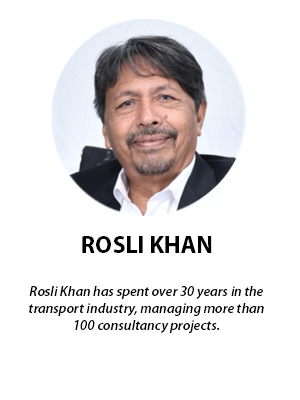
A recent FMT article highlighting the outdated nature of our five-year Malaysia Plan (MP) attracted my attention.
Historically, the five-year MP has been our blueprint for national advancement.
Inspired by Dr Mahathir Mohamad’s economic vision, Malaysia has leaned on major infrastructure projects to fuel her economic progression.
Some standout projects include the North-South Expressway, the establishment of Putrajaya, KLIA, the iconic Petronas Twin Towers, the loss-making Proton and Perwaja Steel Mill, the problematic LRT1 and the SMART Tunnel, which is not so smart after all.
However, this construction-centric approach to our economy has evident gaps.
Old school economics
Often perceived as an old-school economic strategy, such an approach predominantly benefits big construction conglomerates.
The plan was for these corporate giants to involve smaller businesses so that everyone gets a piece of the proverbial pie. As it turned out, the strategy was naïve, flawed and hardly ever achieved its purpose.
More often than not, the major players would hog the projects, take a large slice of profits and leave only scraps for the smaller sub-contractors and suppliers.
What is worse is that such projects breed corruption and have led to corrupt practices which the government has been unable to shake off.
This approach is not just old-fashioned. It actually hinders growth of the entrepreneurial spirit, derides local suppliers and small contractors, mocks the working class and offers scarce benefits to the majority.
In fact, if we sought to identify the local firms participating in the ECRL, MRT, HSR, RTS, double tracking and other large-scale projects, and compute the earnings of the Malaysians employed, we might well find that they represent only a small percentage of the mammoth project costs.
Mahathir’s ‘cut and paste’ economic model
Persisting with Mahathir’s asinine “cut and paste” economic model, not only hampers our economy but also accentuates the divide between Malaysia’s business giants and the country’s smaller entities.
Given the swift shifts in the present day’s global economic scenarios, it would be foolish to persist with blind adherence to Mahathir’s often-unchallenged plans.
Although they may have had some limited success previously, the former prime minister’s strategies are not tailored to address today’s challenges, such as empowering local SMEs and suppliers to elevate our economy.
In fact, Mahathir’s plans mostly only involved the “big boys”. It lacked robust mechanisms to address poverty and ensure entrepreneurial growth across the board.
Why, then, would we stick to such an approach?
Embracing agro-economics
Now, more than ever, this government must diversify its strategies, and allow agriculture and food security to take centre stage.
Our country’s economic resilience could very well hinge on our ability to be self-sufficient in food production.
The substantial capital leaving our shores due to heavy food imports is not just a drain on our resources. It also reveals a glaring vulnerability in our economic fabric.
Relying on imports in critical sectors, including farming and food production, subjects our nation to external price fluctuations, supply chain disruptions and geopolitical tensions.
Fixation on mega projects
Moreover, our fixation on mega-infrastructure projects, though inspired by the vision of our few conglomerates, is becoming a double-edged sword.
The MRT, LRT, HSR, and ECRL may sound like impressive feats, but pull significant financial resources outwards due to hefty costs associated with importing cutting-edge technology and international expertise.
While global collaboration is valuable, a balance is needed.
We must ask ourselves: At what cost are we integrating these massive projects? Is the price of technological advancement leading us to an economic imbalance?
Even as the Klang Valley is modernised, the rest of the country struggles without decent basic infrastructure and jobs for its population.
Our approach to the food import sector especially needs a major overhaul.
The sector’s current structure, marred by monopolistic behaviours and cartel dominance, does more harm than good, has long stymied fair competition, and is driving up prices.
This not only hurts consumers but also discourages local entrepreneurs from entering the fray, further stifling innovation and self-reliance.
The food production sector, largely overlooked in mainstream discussions, should be at the forefront of our economic plans.
It holds vast potential, not just for self-sufficiency but for export opportunities and job creation.
Given these pressing concerns and the rapidly changing global economic landscape, it is evident that Malaysia cannot afford to be passive.
Mere replication of old economic strategies will no longer suffice. We need a dynamic shift in our vision, policies, and execution.
The challenge is clear: innovate, adapt, and ensure that our strategies are holistic, sustainable, and in sync with the aspirations of a modern Malaysia, poised to lead in the 21st century. - FMT
The views expressed are those of the writer and do not necessarily reflect those of MMKtT.



No comments:
Post a Comment
Note: Only a member of this blog may post a comment.